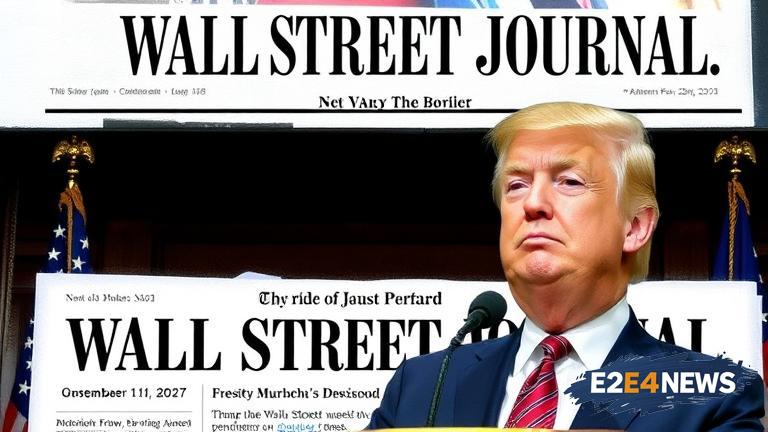Former US President Donald Trump has filed a lawsuit against the Wall Street Journal and media mogul Rupert Murdoch, alleging defamation in the newspaper’s reporting on his business dealings. The lawsuit, filed in a Florida court, claims that the Wall Street Journal published false and misleading information about Trump’s business dealings, damaging his reputation. Trump’s lawyers argue that the newspaper’s reporting was motivated by a desire to harm Trump’s reputation and advance the interests of its owner, News Corp, which is controlled by the Murdoch family. The lawsuit also names Rupert Murdoch, the executive chairman of News Corp, as a defendant, alleging that he was involved in the decision to publish the allegedly defamatory articles. The Wall Street Journal has denied any wrongdoing, saying that its reporting was fair and accurate. The lawsuit is the latest in a series of legal actions taken by Trump against media outlets and journalists who have reported on his business dealings and personal life. Trump has a long history of suing or threatening to sue media outlets and journalists who he claims have defamed him. The lawsuit against the Wall Street Journal and Rupert Murdoch is likely to be closely watched, given the high profile of the parties involved and the potential implications for freedom of the press. The case could also have significant implications for the way that media outlets report on public figures and the business dealings of politicians. Trump’s lawyers have asked the court to award him damages and to order the Wall Street Journal to retract its allegedly defamatory articles. The Wall Street Journal has said that it will vigorously defend itself against the lawsuit, arguing that its reporting was protected by the First Amendment. The lawsuit is likely to be a lengthy and complex one, with both sides presenting extensive evidence and arguments. The outcome of the case could have significant implications for the media industry and the way that journalists report on public figures. The case could also be seen as a test of the limits of free speech and the ability of public figures to sue media outlets for defamation. Trump’s decision to sue the Wall Street Journal and Rupert Murdoch has been widely criticized by free speech advocates, who argue that it is an attempt to intimidate and silence journalists who are critical of him. The lawsuit has also been seen as part of a broader pattern of behavior by Trump, who has frequently attacked and criticized media outlets and journalists who he claims have treated him unfairly. Despite the criticism, Trump’s lawyers have said that they are confident that they will win the case and that the Wall Street Journal and Rupert Murdoch will be held accountable for their allegedly defamatory reporting. The case is likely to be a major news story in the coming weeks and months, with many observers watching closely to see how it unfolds. The lawsuit has also sparked a wider debate about the role of the media in reporting on public figures and the business dealings of politicians. Many have argued that the media has a critical role to play in holding public figures accountable and that Trump’s lawsuit is an attempt to undermine this role. Others have argued that the media must be careful to ensure that its reporting is accurate and fair, and that Trump’s lawsuit is a legitimate response to allegedly defamatory reporting.
